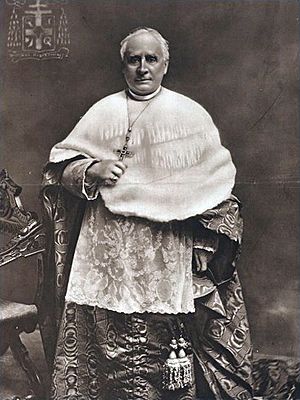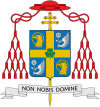John Murphy Farley facts for kids
Quick facts for kids His Eminence John Murphy Farley |
|
|---|---|
| Cardinal Archbishop of New York | |
 |
|
| See | New York |
| Appointed | September 15, 1902 |
| Reign ended | September 17, 1918 |
| Predecessor | Michael Corrigan |
| Successor | Patrick Joseph Hayes |
| Other posts | Cardinal-Priest of S. Maria sopra Minerva |
| Orders | |
| Ordination | June 11, 1870 |
| Consecration | December 21, 1895 by Michael Corrigan |
| Created Cardinal | November 27, 1911 |
| Rank | Cardinal-Priest |
| Personal details | |
| Born | April 20, 1842 Newtownhamilton, County Armagh, Ireland |
| Died | September 17, 1918 (aged 76) Mamaroneck, New York, United States |
| Buried | St. Patrick's Cathedral, New York |
| Previous post |
|
| Motto | Non Nobis Domine (Not Unto Us, O Lord) |
John Murphy Farley (born April 20, 1842 – died September 17, 1918) was an important cardinal in the Catholic Church. He was born in Ireland and later became an American citizen. He served as the Archbishop of New York from 1902 until he passed away in 1918. In 1911, he was given the high honor of becoming a cardinal.
Contents
John Farley's Early Life and Schooling
John Farley was born in a place called Newtownhamilton in County Armagh, Ireland. His parents were Catherine Murphy and Philip Farrelly. When he was twelve years old, both his parents had passed away. He then went to live with his mother's family.
He started his education with a private teacher named Hugh McGuire. Later, he attended St Macartan's College in Monaghan from 1859 to 1864.
Moving to America and College Years
In 1864, John Farley moved to the United States with help from his uncle. This was during the American Civil War. He quickly enrolled at St. John's College in New York City. He finished his studies there in 1865.
After college, he began training to become a priest. He studied at St. Joseph's Provincial Seminary in Troy. In 1866, he went to Rome to continue his studies at the Pontifical North American College. He was in Rome during the entire First Vatican Council, an important meeting of Catholic leaders.
Becoming a Priest
Farley became a priest on June 11, 1870. He was ordained by Cardinal Costantino Patrizi Naro. After returning to New York, his first job was as a curate (a priest who helps the main priest) at St. Peter's Church (Staten Island). He worked there for two years.
In 1872, he became a secretary to Archbishop John McCloskey. Farley had met McCloskey earlier in Rome. Around this time, he changed the spelling of his last name from "Farrelly" to "Farley." He even traveled with Archbishop McCloskey to Rome for a special meeting to choose a new Pope in 1878. However, they arrived after Pope Leo XIII had already been chosen. Farley also wrote about Cardinal McCloskey for a book called the Catholic Encyclopedia.
Leading St. Gabriel's Church
From 1884 to 1902, Farley was the pastor (the main priest) of St. Gabriel's Church in Manhattan. During his time there, he helped the church pay off its debts. He also oversaw the special ceremony to make the church sacred and built a hall for the community.
He received special titles from the Pope. In 1884, he was named a "monsignor" (a title for a priest who has done special service). In 1892, he was given an even higher monsignor rank. Besides his work at St. Gabriel's, Farley also served as the vicar general for the Archdiocese of New York from 1891 to 1902. This meant he helped the Archbishop manage the entire area. He also led the Catholic school board. He organized a parade for Catholic schools in 1892 and an exhibit in 1894. In 1895, he received another special title, "protonotary apostolic."
Becoming a Bishop and Cardinal
| Styles of John Murphy Farley |
|
|---|---|
 |
|
| Reference style | His Eminence |
| Spoken style | Your Eminence |
| Informal style | Cardinal |
| See | New York |
On November 18, 1895, Pope Leo XIII chose Farley to be an auxiliary bishop of New York. This meant he would help the main bishop. He also became the titular bishop of Zeugma in Syria, which is a special title. He officially became a bishop on December 21, 1895. Archbishop Michael Corrigan led the ceremony at St. Patrick's Cathedral.
When Archbishop Corrigan passed away on May 5, 1902, Farley temporarily managed the archdiocese. Then, on September 15, 1902, he was named the fourth Archbishop of New York. In 1905, he received another honor, being named an Assistant at the Pontifical Throne.
Becoming a Cardinal and World War I
Pope Pius X made him a Cardinal Priest on November 27, 1911. This is a very high rank in the Catholic Church. He was one of the cardinals who voted for the next Pope in 1914, when Pope Benedict XV was chosen.
When World War I began, Cardinal Farley spoke about loyalty. He said that Catholics in America should be completely loyal to the United States government. He believed it was their duty to support the country's needs. He hoped for peace, but felt that lasting peace might only come if Germany's military was defeated or if the German people rejected their leaders. He strongly disliked any criticism of the government during the war, calling it almost like treason.
Focus on Education and Final Years
As Archbishop, Cardinal Farley made Catholic education a top priority. In his first eight years, he helped start almost fifty new parochial schools (Catholic schools). He also founded the Cathedral Preparatory Seminary, a school for young men who wanted to become priests.
He was known for taking daily walks with one of his priests. He believed that walking helped him think clearly.
Cardinal Farley passed away in Mamaroneck at the age of 76. He is buried in a special crypt (an underground burial place) beneath the altar of St. Patrick's Cathedral.
 | Anna J. Cooper |
 | Mary McLeod Bethune |
 | Lillie Mae Bradford |

